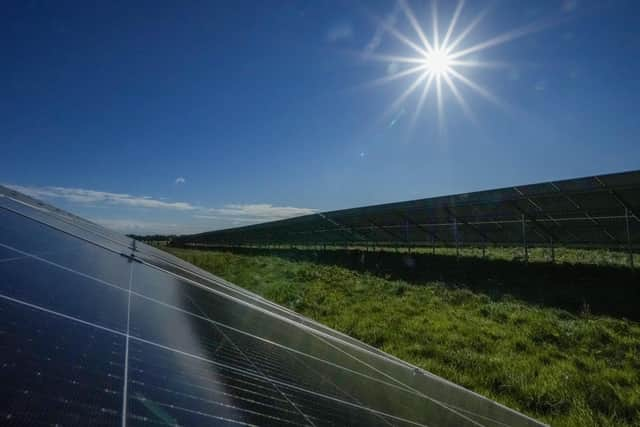Why solar farm plan is opposed by this North Yorkshire village which claims it will also not benefit from green energy bid – Yorkshire Post Letters


WITH reference to the article ‘Community split on solar farm at countryside site’ (The Yorkshire Post, March 5), I am a resident of the village of Husthwaite opposed to the Woolpots solar farm scheme.
I believe it is essential to make it clear to readers that, in my view, the community is not split and that there are bigger issues at stake here.
Advertisement
Hide AdAdvertisement
Hide AdThis is not a story of some well-off nimbies trying to hold back the use of renewable energy to help tackle the rapidly growing impacts of climate change.


It is a case study of how local democracy is being stifled by central government and its supporters in local councils. It is also an excellent example of the urgent need for a logical UK-wide energy strategy which promotes the use of green energy in our local communities.
First, take local democracy. The proposed 250 acre Woolpots solar farm is just the latest in a series of random proposals facing Husthwaite – and many other villages in Yorkshire and elsewhere – put forward by opportunistic developers with the support of local landowners and farmers suffering the financial consequences of Brexit.
Aside from Woolpots, these proposals include housing developments which are not needed and include no affordable housing for younger people and occupy good agricultural land or green space with drainage and flooding problems.
Advertisement
Hide AdAdvertisement
Hide AdThe second key issue we face is a lack of a coherent UK-wide strategy when it comes to green energy schemes of direct benefit to local communities anxious to cut their carbon footprints.
Many Husthwaite homeowners have made use of incentives to install solar panels on their roofs or even costly ground source heating systems. However, these incentives are disappearing and in a village with no access to natural gas, most homes will continue to rely on kerosene oil for their heating requirements.
The proposed 250 acre solar scheme would on the face of it have provided a great opportunity to help green the local community. However, like the existing 200 acre facility it would sit alongside (and owned by Warrington Council for the benefit of its citizens), the benefits of low carbon power would go elsewhere.
Under the existing regulations governing the UK electricity market, it would not be possible to assist the local community. However, these regulations derive from political decisions and can be changed.
Advertisement
Hide AdAdvertisement
Hide AdAs climate change accelerates, agricultural land will become critical to our ability to feed our people. It makes no sense to put it under solar panels when there are better alternatives.
From; Kevin Hollinrake, Conservative MP for Thirsk and Malton.
THIS morning (Wednesday, March 9), I met with Environment Secretary, George Eustice, to raise the ongoing issue of planned solar farms on farmland in my constituency at Eden Farm, Old Malton and Peter Hill, Husthwaite.
Although supportive of renewable energy and reducing our reliance on imports of fossil fuels, I stressed my very strong concerns about these proposed developments on the landscape, our ability to feed the nation and fair compensation for tenant farmers.
Advertisement
Hide AdAdvertisement
Hide AdMr Eustice was sympathetic to the issues I relayed, that of lack of sufficient compensation to tenant farmers and the fact although planning policy is very clear that large scale solar should not be located on best and most versatile land, this condition is potentially being undermined by local councils declaring climate emergencies and making this a material consideration when determining an application.
The use of non-agricultural development provisions in the context of tenanted farms is also urgently in need of reform as the compensation levels for farmers driven off their land is derisory, whilst the financial opportunity for the landowner is very large.
I am therefore pleased Mr Eustice has agreed to take these matters up with Michael Gove and the Department for Levelling Up, Housing and Communities and in the Tenancy Working Group.
I will continue to raise these matters on behalf of Thirsk and Malton constituents and hope to provide further updates as soon as possible.
From: Jarvis Browning, Fadmoor, York.
Advertisement
Hide AdAdvertisement
Hide AdTHERE’S plenty of natural gas in the North Sea to be got and plenty of other resources to use, so no need to reintroduce shale fracking in this country. It’s more damaging to the environment than the traditional methods of extracting gas.
Support The Yorkshire Post and become a subscriber today. Your subscription will help us to continue to bring quality news to the people of Yorkshire. In return, you’ll see fewer ads on site, get free access to our app, receive exclusive members-only offers and access to all premium content and columns. Click here to subscribe.
Comment Guidelines
National World encourages reader discussion on our stories. User feedback, insights and back-and-forth exchanges add a rich layer of context to reporting. Please review our Community Guidelines before commenting.